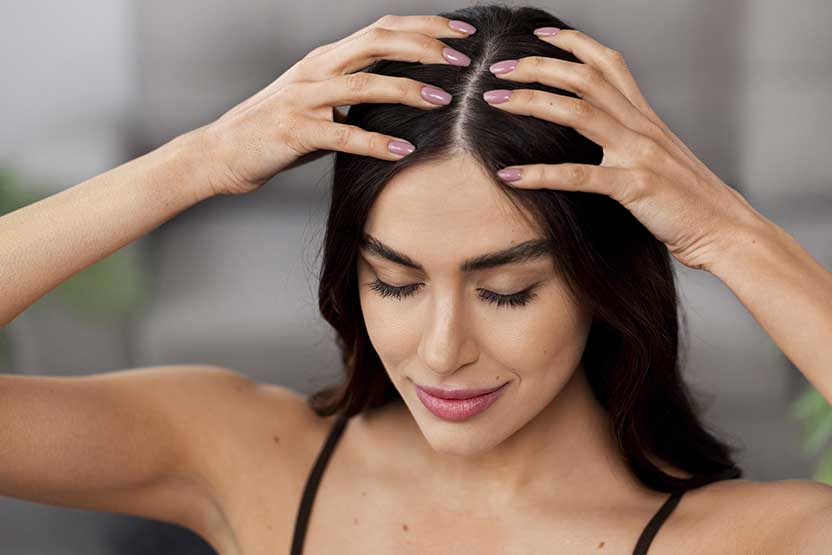How to Keep Your Scalp Healthy Naturally?

A healthy scalp is the foundation for strong and beautiful hair. When your scalp is well-nourished, free from irritation, and properly balanced, it supports healthy hair growth and prevents common issues like dandruff, itchiness, and excessive oiliness. The best way to maintain scalp health is through natural methods, avoiding harsh chemicals that can strip away essential moisture and disrupt the scalp’s natural balance. In this article, we’ll explore effective and natural ways to keep your scalp healthy and thriving.
How to Keep Your Scalp Healthy Naturally:
1. Maintain a Balanced Diet
What you eat directly impacts your scalp and hair health. A diet rich in vitamins, minerals, and antioxidants promotes a nourished scalp and stronger hair follicles. Consider including:
- Omega-3 fatty acids (found in walnuts, flaxseeds, and fatty fish) to keep the scalp hydrated.
- Vitamin E (found in almonds, sunflower seeds, and spinach) to improve circulation to the scalp.
- Biotin (found in eggs, nuts, and sweet potatoes) to support hair growth.
- Iron and Zinc (found in beans, lentils, and lean meats) to prevent hair thinning and breakage.
- Hydration: Drinking enough water helps maintain the scalp’s natural moisture balance.
2. Use Natural Oils for Scalp Nourishment
Essential and carrier oils provide deep nourishment, reduce dryness, and keep the scalp healthy. Some effective natural oils include:
- Coconut Oil: Deeply hydrates the scalp and has antimicrobial properties to prevent infections.
- Castor Oil: Stimulates blood circulation and promotes hair growth.
- Jojoba Oil: Balances scalp oil production and keeps the skin moisturized.
- Tea Tree Oil: Fights dandruff and soothes irritation due to its antifungal and antibacterial properties.
How to Use:
Massage a few drops of your chosen oil into your scalp, leave it on for at least 30 minutes (or overnight for deep conditioning), and wash it off with a mild shampoo.
Find out What Hair Oil Is Best for Hair Growth.
3. Wash Your Hair with a Gentle, Natural Shampoo
Many commercial shampoos contain harsh sulfates and synthetic chemicals that strip away the scalp’s natural oils, leading to dryness and irritation. Instead, opt for:
- Sulfate-free, paraben-free shampoos.
- Herbal or ayurvedic shampoos with ingredients like aloe vera, hibiscus, and neem.
- DIY natural cleansers such as diluted apple cider vinegar or aloe vera gel.
Avoid over-washing your hair, as it can lead to excessive dryness or oiliness. Washing 2-3 times a week is ideal for most hair types.
4. Exfoliate Your Scalp Regularly
Just like your skin, your scalp benefits from occasional exfoliation to remove dead skin cells, excess oil, and product buildup.
Natural Exfoliating Methods:
- Sugar & Coconut Oil Scrub: Mix 2 tablespoons of sugar with coconut oil and gently massage your scalp.
- Oatmeal & Yogurt Mask: Helps soothe and gently exfoliate the scalp.
- Apple Cider Vinegar Rinse: Balances pH and removes buildup.
Exfoliate once every two weeks for the best results.
5. Keep Your Scalp Hydrated
Dryness can lead to flakiness, itchiness, and an unhealthy scalp environment. To maintain hydration:
- Drink plenty of water throughout the day.
- Use aloe vera gel as a natural moisturizer for the scalp.
- Avoid excessive heat styling and chemical treatments that can dry out the scalp.
6. Manage Stress Levels
Stress is a major factor that can lead to scalp issues such as hair loss and excessive oil production. To reduce stress naturally:
- Practice yoga or meditation.
- Get regular exercise.
- Ensure sufficient sleep each night.
- Engage in relaxing activities such as reading or spending time in nature.
7. Protect Your Scalp from Environmental Damage
Environmental pollutants, UV rays, and harsh weather conditions can affect scalp health. Protect your scalp by:
- Wearing a hat or scarf when exposed to direct sunlight.
- Rinsing your hair after swimming in chlorinated pools or salty seawater.
- Using natural hair masks to repair damage and maintain scalp health.
Frequently Asked Questions (FAQ)
1. How can I tell if my scalp is unhealthy?
Signs of an unhealthy scalp include excessive dryness, dandruff, itchiness, redness, hair thinning, and excessive oiliness. If you notice any of these symptoms, consider making changes to your hair care routine using natural remedies.
2. Can I apply oils to my scalp every day?
While oils are beneficial, daily application can sometimes lead to product buildup. It’s best to oil your scalp 2-3 times a week and wash it off with a gentle shampoo.
3. What are the best home remedies for an itchy scalp?
Aloe vera gel, diluted apple cider vinegar, tea tree oil (mixed with a carrier oil), and coconut oil are great natural remedies for soothing an itchy scalp.
Conclusion
Maintaining a healthy scalp naturally is simple and effective when you follow the right practices. A balanced diet, regular scalp massages with natural oils, gentle hair washing, and stress management all contribute to a nourished and irritation-free scalp. By incorporating these natural remedies into your routine, you’ll not only improve your scalp health but also enjoy stronger, healthier hair in the long run.



